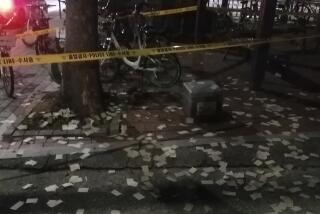South Korean Media Mute Criticism in Quake Coverage
- Share via
KOBE, Japan — Partly because this suffering city is home to a large number of ethnic Koreans, media from South Korea are giving extensive coverage to the aftereffects of last week’s devastating earthquake.
South Korean reporting about Japan, a former colonial master and historical enemy, often is filled with contempt. This pattern was reflected in some early coverage of the earthquake, with comments such as “Japanese pride collapsed together with the Hanshin Expressway,” in the daily Chosun Ilbo on Jan. 18, the day after the quake.
But by the next day, the South Korean accounts had taken on a more positive tone--albeit one with a trace of cynicism.
“It was almost scary to witness the calm and orderliness of Kobe citizens dealing with the calamity,” reported the Joong Ang Ilbo on Jan. 19. “During the two days of blackout, there was no looting and no crime. . . . People calmly lined up in front of a few shops open to buy essential daily necessities. And they bought only enough so other people would also have access to them. Shop owners did not try to take advantage of the situation either.”
On the same day, the Chosun Ilbo also showed that South Koreans were impressed by how the Japanese were coping.
“Are these the same Japanese that hunted down 6,000 of our compatriots 72 years ago?” the paper asked.
South Korean media have focused on Korean residents in Kobe and on practical issues such as the quake’s impact on bilateral trade.
The Chosun Ilbo reported that, as of Tuesday, a total of 134 Koreans were confirmed dead and that about 80% of 500 shoe factories operated by Koreans here turned to ashes in fires that followed the quake.
South Korean newspapers and television networks have recounted many emotional anecdotes of people helping each other without regard to ethnicity: Korean residents from other areas coming to the aid of their compatriots with drinking water, blankets, clothing, noodles and rice, and distributing them not only to Koreans but also to Japanese.
South Korean media have not reported any discriminatory treatment in the quake aftermath, despite traditional Japanese prejudice against Koreans in areas ranging from marriage to employment.
After the great Tokyo earthquake of 1923, rumors spread blaming Koreans for some of the devastating fires that broke out, and mobs attacked and killed many Koreans.
Times researcher Chi Jung Nam in Seoul contributed to this report.
More to Read
Sign up for Essential California
The most important California stories and recommendations in your inbox every morning.
You may occasionally receive promotional content from the Los Angeles Times.













